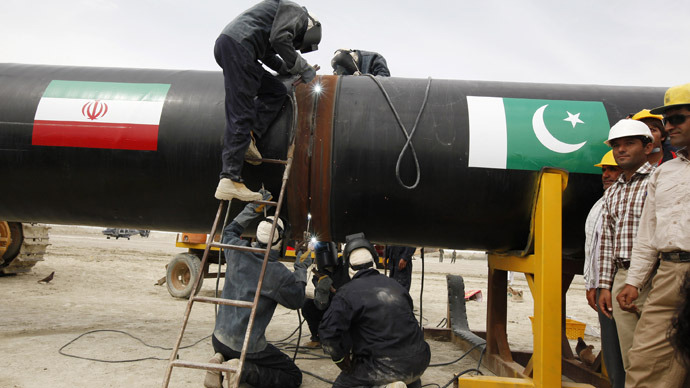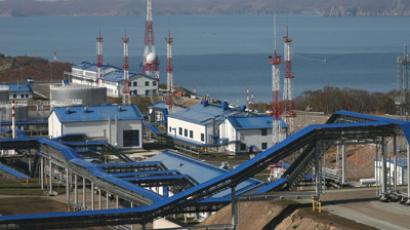US threatens Pakistan with sanctions over Iran gas pipeline

The US has threatened Islamabad with sanctions over Pakistan’s partnership with Iran to construct a section of a gas pipeline. Washington said that the much-delayed $7.5-billion project violates sanctions on Iran, a claim denied by Pakistan.
Iran and Pakistan expect the completed pipeline will deliver
21.5 million cubic meters (760,000 million cubic feet) of gas per
day to Pakistan from its giant offshore South Pars field in the
Persian Gulf by December 2014.
Iranian contractors will construct the pipeline, which crosses
Pakistani territory. Tehran has agreed to lend Islamabad $500
million, one-third of the estimated $1.5 billion cost of the
750-kilometer pipeline, according to Fars news agency.
After Iranian President Mahmoud Ahmadinejad and his Pakistani
counterpart Asif Ali Zardari launched the project on Monday on the
Iran-Pakistan Border, the US threatened to respond with sanctions
if the project “actually goes forward.”
“We have serious concerns if this project actually goes
forward that the Iran Sanctions Act would be triggered,” State
Department spokesperson Victoria Nuland said, commenting on the
so-called ‘peace pipeline.’
Iran has completed 900 kilometers of the pipeline’s segment on
its side of the border with Pakistan. Monday's ceremony marked the
beginning of work on the Pakistani segment, which will start at the
Iranian town of Chahbahar near the border.
“We've heard this pipeline announced about 10 or 15 times before in the past. So we have to see what actually happens,” Nuland said.

Conceived in 1990s, the project initially involved Iran,
Pakistan and India. However, India pulled out of the project in
2009, citing cost and security issues. The United States has
persistently opposed Pakistani and Indian involvement in the
project, insisting it would violate sanctions against Iran over its
controversial nuclear activity.
Nuland reiterated that the US is working to increase Pakistan’s
energy supplies through other means: “This pipeline project, if
it actually goes forward – we've seen that promise many times –
would take Pakistan in the wrong direction right at a time that
we're trying to work with Pakistan on better, more reliable ways to
meet its energy needs.”
The US is "supporting large-scale energy projects in Pakistan that will add some 900 megawatts to the power grid by the end of 2013," she added.
With Pakistan currently facing energy shortages, Washington
appears reluctant to keep its pledge despite its
assurances.
“The Americans have only given promises and signed some kind
of memorandum of understanding on this issue, but nothing has been
implemented on the ground,” RT’s Tariq Mahiyuddin, who is
currently in Pakistan, said.
Pakistan sees the pipeline as a way of easing severe energy
shortages, which have sparked demonstrations and battered a weak
government. At the same time, Islamabad needs the financial aid it
receives from the US.
In response to Washington’s threats of sanctions, President
Ahmadinejad accused "foreign elements" of using Iran’s
nuclear program as a pretext to thwart Iran-Pakistan relations,
saying they have no grounds to oppose the pipeline project since it
deals with natural gas.
"With natural gas you cannot make atomic bombs. That's why
they should have no excuse to oppose this pipeline," Reuters
reported, quoting a translation of a televised statement by
Ahmadinejad. "I want to tell those individuals that the gas
pipeline has no connection whatsoever with the nuclear
case."

Deal too sweet to renege on
The beneficial terms Iran has offered Pakistan were the crucial
point in the two countries' agreement, Reza Marashi, research
director at the National Iranian American Council told RT.
“The Iranians put up $500 million of a $1.5 billion project loan
to the Pakistanis. And the construction is already halfway
done,” he explained. “So it is going to be tough to get the
Pakistanis to renege on this completely but the United States is
not going to let up the pressure going forward.”
The following months will give a good indication of Pakistan’s
intentions, Marashi believes.
“Whether are they trying to raise the stakes vis-à-vis the United States or are they trying to address the very real energy shortages by pursuing sweetheart deals that a heavily sanctioned Iran can offer,” he said. “If there were legitimate alternative energy sources that the Pakistanis could pursue chances are that the United States would have pointed them out by now.”
“But even if you find those alternative sources, few are
going to be able to offer the terms that the Iranians are
offering,” Marashi added.
‘Pipeline undermines US hegemony in the region’
The Iran-Pakistan pipeline could undermine US hegemony in the
Middle East and South Asia, Eric Draitser, an independent
geopolitical analyst and founder of StopImperialism.com wrote for RT: “The pipeline brings the two
countries closer together and, in so doing, helps to solidify a
relationship united by a common mistrust of the US.”
Anthony Skinner, director of British-based Maplecroft risks
consultancy, echoed the idea that Pakistan wants to show its place
on the international stage by daring to make decisions that
“defy the US.”
"The Pakistani government wants to show it is willing to take
foreign policy decisions that defy the US,” Skinner said,
according to Reuters. "The pipeline not only caters to
Pakistan's energy needs, but also lodges brownie points with the
many critics of the US amongst the electorate."
Draitser also believes that the “peace pipeline” will be
a success, especially if China decides to become involved: “In
this very plausible scenario, China would finally get the ‘holy
grail’ it has sought for years: land-based access to energy imports
from the Middle East. For China, an energy-starved economy
that continues to grow, this would greatly enhance their regional
position.”
“It would also transform the balance of power in Asia, as the
era of US domination of energy resources in the Middle East would
be over,” he added. “So, were the project to be extended to
China, the pipeline would become the focus of a new power paradigm,
making it one of the most important economic development projects
in the world.”













